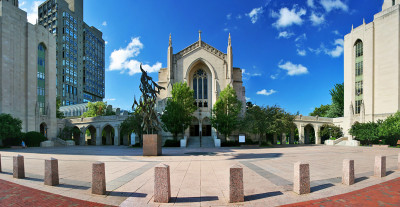
After Boston University’s ranking as the 41st best university in the United States by U.S. News and World Report was made public on Wednesday, members of the BU community have attributed the increase — up from 42 last year — to BU’s unity and quality of research.
This year’s ranking ties for the highest rank BU has ever received. The university landed the same ranking two years ago in the 2014 report.
BU is tied with Rensselaer Polytechnic Institute, Tulane University, the University of California, Davis, the University of Illinois at Urbana-Champaign and the University of Wisconsin-Madison. BU has advanced ahead of former tie-holder Northeastern University, which declined to 47 from 42.
BU spokesman Colin Riley said BU’s “recognition of astounding caliber” is due to the leadership of the president and senior staffs who attract “outstanding” faculty, staff and students.
“[The] One BU approach, the continued strength of the scholarship and research at the university, the comprehensive campaign to bring financial support to students [and] financial assistance to hiring new faculty” are among the many factors contributing to BU’s current acknowledgment, Riley said.
Riley added that prospective students should visit college campuses as it is “far more valuable than any ranking system” in determining a student’s ability to grow both personally and academically.
BU College of Arts and Sciences professor Virginia Sapiro said these rankings are important in order to measure what universities have been doing, and students aiming for high-ranked institutions will consider BU seriously.
“The U.S. News ranking is only one of many indications that Boston University has been advancing in a multitude of ways for many years,” the former CAS dean said in an email, “in undergraduate and graduate education, research, our contributions to the broader society and our connections with our alumni.”
The U.S. News report stated that finding the best college experience for prospective students does not solely and completely depend on rankings, but it acknowledged that these rankings are a thoughtful starting point for research.
“[The rankings] allow you to compare at a glance the relative quality of institutions based on such widely accepted indicators of excellence,” the 2016 report stated, addressing parents and potential students. “Many factors other than those spotlighted [in the report] will figure in your decision.”
Clarifying their ranking methodology, U.S. News stated that this year they have implemented a different procedure in compiling ranking indicators.
“The academic peer scores are based on the two most recent sets of survey results, collected in spring 2014 and spring 2015,” the report stated. “Using two years of data reduces year-to-year volatility in the results.”
Jay Halfond, a professor of education and former dean of BU’s Metropolitan College, said that BU has been “undervalued and under-recognized” in past years.
“This region is the epicenter of quality higher education. This makes it difficult for a university even of the caliber of BU to stand out,” Halfond said in an email. “BU’s success in recent years is in achieving recognition for its own strengths and merits, and not just in the shadows of other universities.”
Halfond also pointed out that BU was able to protect its position among other highly recognized national universities, even as Northeastern’s rank plunged.
“Declines do not necessarily mean that a university is worse this year compared to last, but could reflect that another universities are receiving a higher level of recognition than in the past,” Halfond said. “Northeastern’s story over the last decade is so impressive, a one-year decline in rankings might not be statistically significant. We shouldn’t take the actual ranking numbers too literally.”
Several students said that the ranking is important, but people should not look into them too much since there are other contributing factors to an institution’s success.
Nabila Abeng, a freshman in the Questrom School of Business, said she expected a high ranking from BU.
“I assume BU would be in the top 50, and that’s one of the reasons I applied to BU,” she said. “However, what reassured my choice was that I felt like I would enjoy living and learning in this place for the next four years of my life.”
Laura Yee, a sophomore in the College of Communication, said that BU should still push for higher rankings.
“Harvard is the second, MIT is seventh and we’re only across the river away, and that says something,” Yee said. “It’s great knowing that we’ve gone up this year, and I’m glad to be part of a well-known and incredible university, but it does not mean that BU should already be satisfied.”
Alexander Delgado, a senior in CAS, said that university rankings prove to be more of use for prospective students and their families than for current college students.
“BU has a really good international and national recognition and it’s not that much of a surprise to me,” he said. “I don’t really bother with ranks right now because I’m at BU and regardless of rankings, [and] I’m loving it.”




